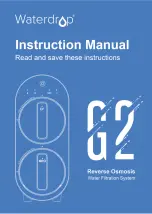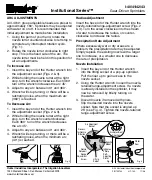
VZN V SERIES
14
P/N 1011079 Rev. J 01/14
INSTALLATION (continued)
Rinsing the Carbon Element and TAC Cartridge
The Carbon Element and TAC Cartridge MUST be rinsed
before using the system the first time and immediately after
the Carbon Element or TAC Cartridge have been replaced.
NOTE: If Installed, remove the TAC Cartridge Element
before proceeding. Do not rinse a new Carbon Element
with the TAC Cartridge Element installed.
1. Install the Carbon Element into the Carbon Element
Housing.
2. Screw the Carbon Element Housing (containing the
Carbon Element) into place on the Carbon Element
Head. The Housing will come to a hard stop at the end
of the thread. Use a Filter Wrench if necessary.
3. If installed, remove the TAC Cartridge Element from the
TAC Cartridge Housing.
4. Screw the empty TAC Housing into place on the TAC
Head. The Housing comes to a hard stop at the end of
the thread. Use a Filter Wrench if necessary.
5. Direct water from the Rinse Ball Valve to a drain. Then
open the Rinse Ball Valve and close the Outlet Ball
Valve.
6. Turn on the water to the system by slowly opening the
Inlet Ball Valve.
7. Allow water to flow through the Carbon Element and
TAC Housings to flush out trapped air and any debris
that may be present.
8. To help remove trapped air from the Housings, press
the RED Pressure Relief Button on the top of the hous-
ings until water just begins to come out.
9. Flush the Carbon Element for at least 5 minutes.
10. Install the TAC Cartridge Element into the TAC Housing
with the arrow on the cartridge pointing up. Reattach
the TAC Housing to the system. Flush for at least 5
minutes.
NOTE: Do NOT consume water used during this process.
11. Close the Rinse Ball Valve when rinsing completes.
12. Open the Outlet Ball Valve. The system is now ready
for use.
13.
For new piping installations:
After making the
connection to the System Outlet:
Open the faucet or tap closest to the filter system
Slowly open the Inlet Valve.
Allow the pipe to flush until all debris is removed.
Sanitizing the System and Lines
The plumbing must be sanitized to eliminate possible contam-
ination that may have occurred during the installation process.
One ounce (30 ml) of liquid chlorine bleach (regular bleach,
unscented 5.25 % - 6 % sodium hypochlorite) or Kay-5
sanitizer solution (Sodium Dichloro-s-Triazinetrione Dihydrate,
6%) or equivalent can be used to sanitize the plumbing.
The Kay-5 sanitizer solution is made by dissolving a 1 oz.
packet of Kay-5 powder in 2 oz. (60 ml) of clean warm water.
This can be done by removing 1 inch from the top of the
Kay-5 packet and adding the 2 oz. of warm water to the pack-
et. Mix with a coffee stirrer to dissolve. When added to the
system, this will create a 60-100 ppm chlorine solution.
NOTE: Follow the handling and safety instructions
supplied with the sanitizer.
NOTE: If installed, remove the Carbon Element and TAC
Cartridge from the system BEFORE Sanitizing.
1. Follow the steps in the
Rinsing the Ultra Filter
Cartridge
in the Installation section of this manual.
2. Turn off the water to the system.
3. Open the faucet or tap closest downstream to the
system.
4. Allow the system and plumbing to drain.
5. Remove the plug installed in the sanitizing "T" fitting at
the inlet of the system. Allow the water to drain out of
the system.
6. Pour the sanitizer into the inlet sanitation fitting using a
cup or funnel. Be careful not to spill the sanitizer onto
clothing or skin.
7. Reattach the plug on the sanitation fitting.
8. Slowly turn on the water supply to the system.
9. Allow water to flow through the system and out of the
open faucet or tap until the smell of sanitizer is present.
10. Close the faucet or tap.
11. Let the system stand without water flow for at least 15
minutes to allow the sanitizer to sanitize the pipes.
12. After 15 minutes without water flow, open the faucet or
tap.
13. Allow water to flow through the system until the
presence of sanitizer is gone.
14. Open all other faucets and taps in line with the system
to flush any remaining sanitizer from the plumbing.
15. Close all faucets and taps.










































